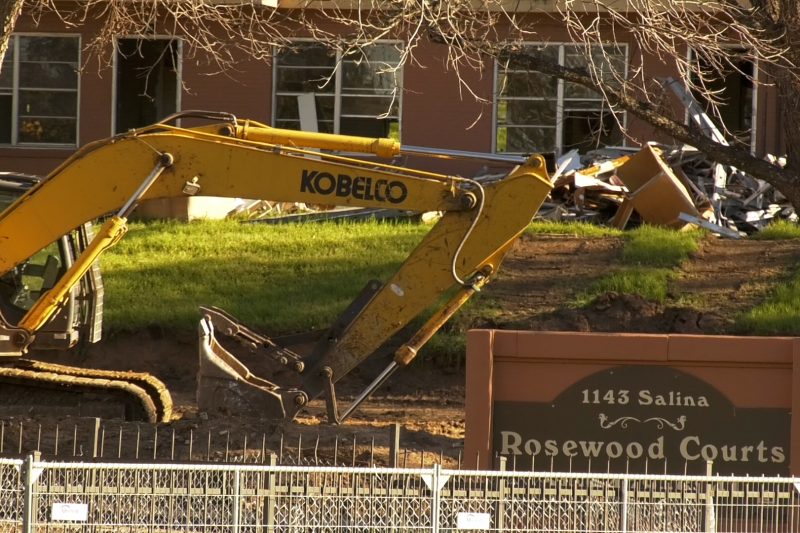Why the Nation’s First African American Public Housing Project is Being Torn Down
By Theo Werner
Reporting Texas TV
AUSTIN, Texas – Construction crews are tearing down Rosewood Courts in East Austin after the complex provided affordable housing for over 80 years.
Sylvia Blanco, the Chief Operating Officer at the Housing Authority for the City of Austin (HACA), said the redevelopment plan will build more public housing while preserving the site’s history.
Built in 1939 as part of President Franklin Delano Roosevelt’s New Deal, Rosewood Courts became the first public housing project for African Americans in the United States. Segregation laws at the time separated housing projects by race.
In recent years, the property has deteriorated beyond simple repairs. Blanco said the outdated construction of Rosewood Courts also lacks many modern standards.
“All of the building systems had just become obsolete,” Blanco said. “It was basically brick construction, no insulation, no central air, no central heat, and very, very little accessibility for persons with mobility issues.”

(Photo: Theo Werner, Reporting Texas TV)
Despite the property’s issues, Rosewood Courts became home to many families over the years, with some units being passed on through multiple generations. Many Austinites feel it is important to preserve the site’s history.
“Austin is constantly growing, but there is a heritage that needs to be either maintained or at least saved somehow so people can know what it was like before,” said John Yeager, an employee at Rockstar Bagels across the street.
HACA began a redevelopment plan in 2013 that would provide modern living standards while honoring the history of the community. The plan includes the construction of three new four-story buildings and the restoration of eight existing buildings.
“What’s also great is we’re going from 124 units to 184 units,” Blanco said. “So that’s actually adding more affordable housing, which is, of course, deeply, deeply needed in Austin.”
The plan also includes a welcome center and kiosks that will highlight the history of Rosewood Courts and the land it was built on.
Thomas J. White, a former slave, bought the five-acre plot of land and established Emancipation Park 34 years before the construction of Rosewood Courts. The park became an important gathering space for the Black Community, hosting many events such as an annual Juneteenth celebration.
The city of Austin later seized the land through eminent domain to build Rosewood Courts. While the annual Juneteenth celebration was eventually moved to nearby Rosewood Park, Blanco believes it is important the history of Emancipation Park is not forgotten.
“I mean, you walk by it, you drive by it, and you just don’t even know the story, and so we’re finally going to be able to do that,” Blanco said.
Public housing expert Jake Wegmann said developing an existing housing project is rather new for HACA, which has caused some concern for members of the community. Critics of the plan cite failed projects in cities like Chicago and Atlanta, where redeveloping old sites led to less housing.
“One of the things that’s important to realize about public housing redevelopment in the United States is that it has varied a great deal from place to place,” Wegmann said. “In a lot of cases, they’ve torn down public housing and maybe replaced only 30 or 40% of the units as public housing in the new development.”
Wegmann said he looks at San Francisco and Seattle as good models for public housing redevelopment. In those cities, housing authorities have made it a priority to maintain the inventory of public housing for any redeveloped properties. Based on HACA’s previous projects, Wegmann believes their plans are reliable.
“My sense of them is they are very committed to maintaining the inventory of public housing,” Wegmann said.
HACA anticipates completion of the project within the next two years. HACA has provided moving and relocation expenses to former residents, who will have the first right to return when the property reopens.